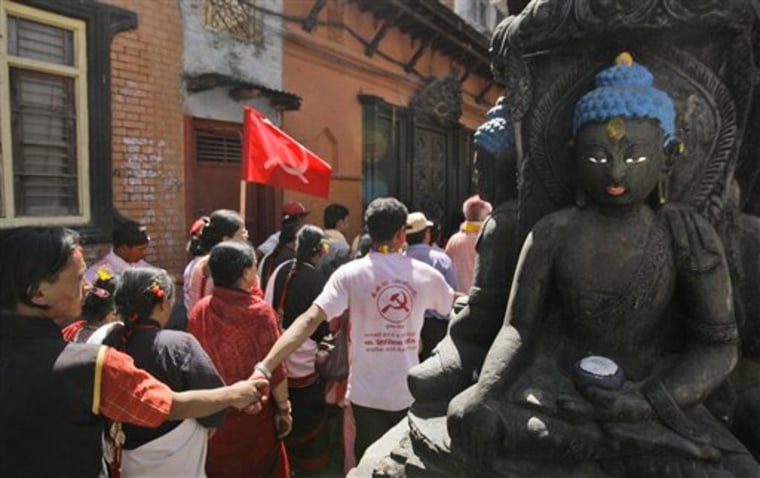Nepal's former communist rebels strengthened their lead in early election results Monday, winning a comfortable majority of the constituencies where counting was complete from last week's landmark vote, officials said.
The ex-rebels, now known as the Communist Party of Nepal (Maoist), have won 108 out of 196 seats allocated, the Election Commission said. The remaining 44 races for directly elected seats have not yet been declared.
The rebels ended their 10-year insurgency in 2006, but the United States still considers them a terrorist organization.
Their strong early showing has surprised most observers, who had expected them to place third behind the traditionally powerful Nepali Congress party and the Communist Party of Nepal (United Marxist-Leninists).
The centrist Nepali Congress was trailing with 31 seats and the United Marxist-Leninists had only 27 seats, the Election Commission said.
Few more weeks for final toll
Final results for the 601-seat Constituent Assembly, which will govern Nepal and rewrite the country's constitution, are still a few weeks off although officials say they should have a clearer picture of what it will look like later this week.
The results announced so far are for members directly elected by voters. They make up 240 seats in the assembly, while 335 are chosen through a nationwide proportional representation system in which political parties are given seats in proportion to the votes they receive, and 26 others are nominated by the government.
The Maoists are now likely to get more than half the 240 directly elected seats, but were predicted to have only about 35 percent of the proportional representation seats.
That lower overall percentage of the vote "might stop them getting a majority in the full 601-seat assembly," said Krishna Khanal, a political analyst with the Tribhuwan University in Katmandu.
Fugitive a winner
Among the election winners was a fugitive contesting as an independent candidate from a southern district.
Bamban Singh is wanted in connection with bombings in the capital, Katmandu, in September 2007 that killed three people and in several other criminal cases, authorities said.
A police official in Rahutahat district, Durga Bhandari, said police have been searching for Singh for 18 months and raided several locations before the election where they suspected he was campaigning.
It was not clear how Singh managed to file nomination papers, but police say he will be arrested if he comes to take his seat in the assembly.
Scattered shootings and clashes that killed two people on election day and eight others in the days leading up to the poll did not deter millions of Nepalis from casting ballots in the country's first election in nine years, and international and national observers hailed the vote.
The election has been touted as the cornerstone of a 2006 peace deal with the rebels in which they ended their armed struggle to join the political mainstream. More than 13,000 people died in the insurgency.
